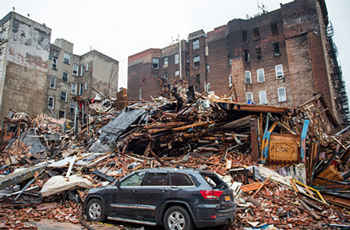

Vol. 79/No. 13 April 13, 2015

|
| AP/New York Times/Nancy Borowick |
| Gas explosion on NYC Lower East Side March 26 killed two, injured about 20 and leveled three buildings. City and Con Edís refusal to replace old pipes means more blasts will occur. |
But the disaster highlights the dangers caused by the profit-driven greed of the gas companies and landlords and the inability of the capitalist government to ensure safety.
The blast leveled three buildings on Manhattan’s Lower East Side, killing two and injuring more than 20. Residents in 60 surrounding apartments were evacuated.
A gas explosion a year ago destroyed two buildings in East Harlem, killing eight and leaving more than 100 working people homeless. The main pipes that provided gas for those buildings dated back to 1887.
On Aug. 6, seven months before the most recent blast, the New York Times reported March 26, Con Ed workers investigating a strong gas odor found a “strange-looking attachment with hoses coming out of it” attached to the gas line for the Sushi Park restaurant on the ground floor of 121 Second Avenue, one of the now destroyed buildings.
Con Ed ordered the improper tap removed and shut all gas to the five-story building for about 10 days, but those living above the restaurant somehow continued to receive gas service, the Times reported.
DNAinfo website writes that, according to its sources, city investigators believe the landlord installed a “jury-rigged hookup” a second time after Con Ed refused to turn on gas for apartments in the building, which was being renovated.
Sushi Park owner Hyeonil Kim told the Times that he frequently checked to make sure the gas line to the restaurant was not tapped again. He told the paper he suspected landlord Maria Hrynenko had been drawing gas for the apartments from the building she owned next door.
On the day of the blast contractors were working on gas lines in the basement to prepare a new connection to the upstairs apartments. Con Ed inspectors were on site to evaluate the work, the Wall Street Journal said, but it failed to pass inspection for the second time and the inspectors left 30 minutes before the explosion. They left without unlocking the valve that would allow gas to flow through the new pipe, although gas continued to flow through the old pipe, the Times said.
DNAinfo reported April 1 that investigators believe someone reinstalled a tap after the inspectors left.
The restaurant manager smelled gas shortly after Con Ed’s inspectors left, he told the Times, and called the landlord. Her son and one of the contractors returned and went to the basement. The building exploded.
The Journal reports police investigators are apparently looking at possible criminal charges against the landlord and the contractor.
“I think Con Ed is really culpable here for not shutting off the gas,” Thomas Curtis, the landlord’s lawyer, told the Times April 1. “They could have shut off the main valve.”
The city’s 100-year-old infrastructure is deteriorating, former New York City Fire Marshal Gene West, who investigated the East Harlem explosion, said in a March 27 video interview on the Bloomberg News website. Gas explosions and fires are “going to happen and continue to happen,” he said. “There’s no way around it.”
Sixty percent of Con Ed’s gas pipes are made of cast iron and unprotected steel. According to the federal Pipeline and Hazardous Materials Safety Administration, serious leaks are four times more frequent in cast iron pipes than pipes made of other material.
According to a March 2014 report issued by the Center for an Urban Future, the cost of replacing the aged leak-prone pipes would be about $18 billion.
More than half of gas mains in the city are 65 years old or older, the report noted. Con Ed pipes averaged 83 leaks per 100 miles of gas main in 2012, 427 attributable to corrosion.
Con Ed bosses think an acceptable replacement schedule is 30 miles of cast iron pipe per year. At that rate, the pipes won’t all be replaced until 2052.
“We will have more fires in these buildings,” West told Bloomberg.
Related articles:
Capitalist greed to blame for NY gas blast
Front page (for this issue) | Home | Text-version home